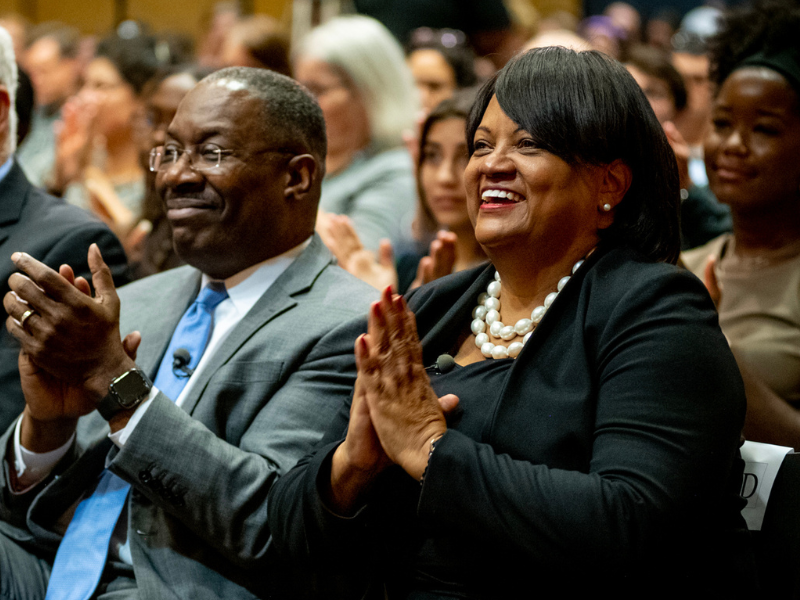Former surgeon general highlights role of business in public health

Over the course of her career, Dr. Regina Benjamin (MBA ’91) has seen many approaches to addressing America’s healthcare problems, from medical to governmental to market based. But during an appearance in the Kendall Cram Lecture Hall on Nov. 2, the former United States surgeon general — and Tulane MBA graduate — said none of those approaches work.
“What I’ve learned is you’ve got to put them all together,” Benjamin explained. “What I’ve done with this business degree is try to bring it together and figure out how we all can work holistically and start to solve our problems, and our problems are holistic problems — you can’t piecemeal them — so that’s why I think the medicine and the business really go together.”
Benjamin, founder and CEO of BayouClinic/Gulf States Health Policy Center and member of the Board of Tulane, shared stories from her life and career in health care for the inaugural Dr. Regina Benjamin Distinguished Lecture. Presented as part of the Tulane Trailblazers initiative, the lecture was co-hosted by the A. B. Freeman School of Business and the School of Public Health and Tropical Medicine.
In a wide-ranging conversation with Thomas LaVeist, dean of the School of Public Health and Tropical Medicine, Benjamin discussed growing up in Alabama, her decision to pursue a medical career, her professional mentors, and her role as the nation’s 18th surgeon general under President Barack Obama.
“One of the things that people don’t realize is that I’m actually a three-star admiral,” she quipped, “so it’s Admiral Benjamin.”
A graduate of Xavier University of Louisiana, Morehouse School of Medicine and the University of Alabama at Birmingham School of Medicine, Benjamin established the Bayou La Batre Rural Health Clinic in 1990 to serve the healthcare needs of residents in Bayou La Batre, Alabama, a poor fishing communty on the Gulf of Mexico.
"A lot of healthcare decisions are made in the boardroom."
--Regina Benjamin
Thrust into the new role of CEO, she enrolled in the Freeman School’s Executive MBA program to gain business skills to help her run the clinic more efficiently. Throughout her conversation with LaVeist, Benjamin praised her experience at the Freeman School for its impact on her life and career.
“I was trying to figure out how to deliver affordable health care to a community that really didn’t have any means,” she said. “My whole goal was to give them good quality care and make it affordable, and I’ve been trying to do that ever since, so [attending] the business school was probably the best decision I ever made.”
Today, as a board member of various healthcare organizations and general partner of a venture capital firm that invests in funds run by underrepresented managers, Benjamin says her business background has proven instrumental in helping her to advocate for the healthcare needs of the poor and underserved.
“I realized that a lot of healthcare decisions are made in the boardroom,” she said. “My MBA really helped me understand the languages they were speaking.”
In the end, Benjamin left students with an inpiring message about the power of the individual.
When she first began practicing medicine in Bayou La Batre, Benjamin said, she noticed that the bayou’s water had turned black. She learned that the local shrimpers were dumping their used motor oil directly into the bayou.
After the EPA and the state health department told her there was nothing they could do to help her, Benjamin took matters into her own hands. She got some barrels, put them on the piers along the bayou and asked the shrimpers to start putting their used oil in them. Over time, the water began to clear up.
“That was a simple solution to a public health issue that didn’t take much,” Benjamin explained. “It didn’t take money, it didn’t take policy, it didn’t take a law. Just do it.
“One person can make a difference,” she added, “whether it’s in medical policy or medical practice.”
